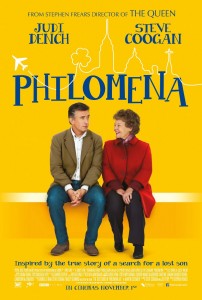The work of forgiveness is hard: Philomena – Review by Meredith Holladay
 Screenplay written by Steve Coogan and Jeff Pope, based on the book by Martin Sixsmith
Screenplay written by Steve Coogan and Jeff Pope, based on the book by Martin Sixsmith
This is not a movie about family. Or searching for a long-lost son.
On the surface it is a movie about family. And it is a movie about searching for a long-lost son. But it is so much more than that. The film touches on love and loss, on the yearning for the past, on the hope placed in the unknowns. What I find most compelling about the story re-told through this film is the triumph of forgiveness, even – and especially – when it is seemingly impossible. Philomena’s story confronts us with one of the most difficult questions about forgiveness and reconciliation: Can we forgive when the other person (or persons, or systems) do not seem sorry, or contrite, or believing they need forgiveness?
The film, based on true events, follows Martin Sixsmith, disgraced journalist for the Labour Party, and Philomena Lee, a retired Irish nurse, as they attempt to find the son Lee was forced to give up for adoption. When she got pregnant as an unwed teenager, her father turned her over to the convent at Roscrea, where she worked in exchange for their care of her son, Anthony, until he was adopted. In her years of wondering and searching, the nuns have been unhelpful, reminding her that she signed over all knowledge of her son’s adoptive family and whereabouts. Aided by Sixsmith’s journalistic tactics, Lee and Sixsmith find even fewer answers. Of course, this wouldn’t be much of a story if the two never uncovered the whereabouts of Lee’s son. Anthony was adopted by American parents, and became Michael Hess. Hess was a lawyer who worked for both the Reagan and George H.W. Bush administrations. He was gay, which meant he lived much of his life closeted. He died at age 43 of AIDS.
One would feel much empathy for Philomena if she chose anger, resentment and bitterness, at the nuns for concealing information from her, and from her son. We find out that Hess did search out the whereabouts of his biological mother, but did not receive information from the nuns at the convent either.
Philomena’s story does not have a happy ending, at least in one sense: she is not reunited with her son, and the nuns do not express remorse or sympathy for their part in concealing information. But Philomena does not turn to bitterness and resentment. Instead, she chooses forgiveness.
 The film is clear that Philomena, while still committed to the Church, has a deep and abiding faith beyond adherence to the institution. Her faith is a faith reliant upon hope and grace – even when those things are hard, as Philomena says to Sixsmith when he questions her ability to forgive: “That is hard for me. But I don’t want to hate people. I don’t want to be like you.”
The film is clear that Philomena, while still committed to the Church, has a deep and abiding faith beyond adherence to the institution. Her faith is a faith reliant upon hope and grace – even when those things are hard, as Philomena says to Sixsmith when he questions her ability to forgive: “That is hard for me. But I don’t want to hate people. I don’t want to be like you.”
The work of forgiveness is hard. We often rely on formulas – if someone is sorry, then we will forgive. That is the recipe we learn as children. We even learn the right signs to know if someone is really sorry. We expect people to “prove” it. If they fulfill their side of the equation, then we will offer forgiveness. (Provided they don’t do it again.)
Philomena offers a third way, much the same way as Christ who instructed Peter to forgive again and again and again – seven times seventy. She forgives. Her forgiveness is not predicated on some outward sign of contrition; in fact, one of the surviving nuns shows no contrition, content in the punishment meted out to Philomena and other young women in her situation. Rather, her forgiveness comes out of her conviction that is the right thing to do, and offering grace is the right way to live.
Because she chooses forgiveness, Philomena is able to understand and embody the reality of God’s grace. In truth, she gets the hard truth of grace – that forgiveness and grace are not a means to and end, but rather an end in themselves – they are a way to live. As soon as they are predicated on someone else’s desert, we are no longer living in the freedom of the profound reality of that grace and love given first from God.
Rev. Meredith Holladay serves as Associate Pastor at First Baptist Church, Lawrence, KS. She holds an M. Div. from Princeton Theological Seminary and a PhD in Religion, Politics and Society from Baylor University. Her dissertation focused on theology and popular music, and she gladly shares music recommendations. In this week, she expands on this, looking at the intersection of theology and film.

